Cycling Cuba had been a vague idea for a while, but I had not organized anything. But the first person I met at the airport in Cancun was actually a German tourguide for bike tours on Cuba. 24 hours later I had a bike, a bag, Cuba maps and bike tools and I knew where the best places on the island were. Now I needed to do it. After a few days in Havanna in which I managed to thoughtlessly spit out in front of a Che Guevara poster and do my workout in the only forbidden area in front oft he US trade center, it was time to leave.
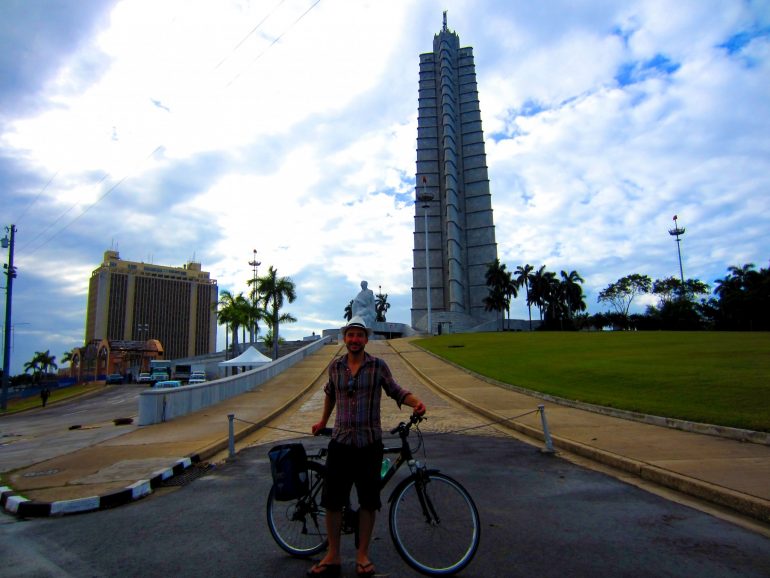
Cycling Cuba – Day 1
When I rise early, the rain is pouring down. But only a little later the sky clears up and I can start my trip after all. When I pass the third intersection I notice that my bike, which I have called Pedro, already has a flat tyre. But the pump fills it with new life, it was aparently just the standing around which epmtied it. On my way South through Cuba’s capital I get lost several times, but the people are helpful and – very different from many other countries – even know their way around. When I finally reach the highway, it is temporarily closed down and there is a big crowd of people staring from all sides. At first, I suspect an accident, but I realize that the reason for all of this is much nicer: A few pimped classic cars are competing in a race while a US documentary team is filming the spectactle. When the fast cars start, the Cubans jump from the road in the last second. I enjoy looking at this strange sight for a while.
Then begins something that I have been looking forward to. I ride my bicycle on the 6-lane highway, as this is permitted by law here in Cuba! Even better: there is hardly any traffic as only a few people can afford a car. The only bummer is the strong head wind I have to fight from the start. I seem to barely move at all. I soon start yelling at the storm and insulting it. Cycling Cuba is bringing out a lot of emotions!
I stop at one of the rare rest stations and am immediately offered rum by some locals. But I have trouble fighting the wind even being sober, so I refuse reluctantly. Because of the wind and as the highway gets a little boring after a while, I decide to make Las Terrazas my goal for the day which is situated a little closer than Soroa where I originally headed and also offers a different route. I turn onto a small road which leads me through little villages with colorful houses. The hills protect me a bit from the wind. Everywhere along the way I see eco gardens. After the fall of the Soviet Union which used to keep Cuba alive back then, the Cubans started using every little free strip of land for planting veggies. Many sustainability experts nowadays refer to this strategy which softened the bad effects of the so-called ‘special period’ at least a little bit. Another thing I constantly see are signs and posters bearing propaganda for the revolution and socialism in general. ‘El Che’, how they fondly call Che Guevara here, is the star on these signs some of which are painted by hand. Just like in Havanna, you don’t see any advertisements at all. There is not much they could advertise for anyway, as there aren’t many things to buy in this country.
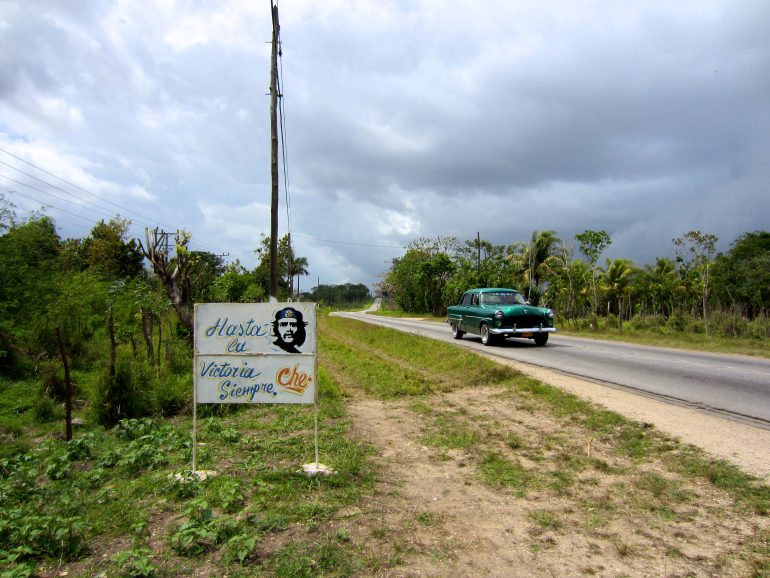
I see a dark cloud coming from ahead of me, the wind gets even stronger. Only seconds later, the downpour begins. A friendly campesino on the road claims that it will all be over in 5 minutes. Luckily, I don’t believe him and seek shelter on the terrace of a semi-destroyed building. The tropical rainshower takes almost an hour. Now, there are hardly any cars on the street, the whole traffic stops due to the weather. The water forms small rivers and there is nothing left for me to do but watch the dirty water sweep along everything in its way. Then suddenly, a bus appears and spits out a very old woman and a small boy who are obviously fascinated by me and my bicycle. We chat for a quarter of an hour about all the world and his brother and they wish my luck when we say goodbye. Energized by the goodheartedness of the people I move on in the ceasing rain.
But it keeps starting again all the time. Before I notice I am wet to the bones. Besides, I have to realize that 65 kilometers are not a short distance for someone whose last time on a bike is already 5 months ago. Soon I am moving like in a trance, I pedal and pedal. Sometimes I pass villages in which kids have converted the road into a soccer field, at times I see nothing and nobody at all. The streets full of potholes lead over hills, I pass stray dogs and sugar cane plantations. My skin is wizen as if I had fallen asleep in the bathtub. Luckily, at least the saddlebag containing my stuff is waterproof.
In the middle of nowhere I meet a farmer who is covered in mud from head to toe. He is drunk and invites me to a glass of milk which he is apparently planning to tap from his only cow. Against my nature and the demands of good manners I recline politely. All I want now is to arrive.
An hour later, when I can barely feel my legs anymore and I have given away my last food to a miserable little dog, I finally reach Las Terrazas. In Cuba you don’t stay in hostels, but in so-called ‘casas particulares’. Normal people rent out one or two guestrooms in their private house, this has only been legal for a few years now. But all three houses which are licensed here are already booked. That’s when I suddenly realize that the people in Soroa might actually be expecting me. The folks from my casa in Havanna have called them in the morning and announced my arrival. But now I really cannot cycle any further, so I take a taxi from the entrance of the nature park. Our way leads us right through the pretty environment.
My hosts have indeed waited for me for hours in their little house amidst the jungle and welcome me exuberantly. I shower hot under a life-threatening boiler and then devour all the food I am given. I am only carrying very few clothes, so I have to wash all my dirty stuff for the following day. Outside, there is a storm raging which throws big palmtree branches onto the metal roof. Nevertheless, I fall alseep quickly after I have decided to stay here for a day.
Day 2
Without being able to say exactly why, I now feel like moving on straight away. I eat the huge breakfast to the last bit and go for a quick hike up to a spectacular viewpoint overlooking the Terrazas park with its trademark hills. Then I prepare Pedro and off I go. Surprisingly, I don’t have any muscle ache and I feel full of energy. People recommend a ruin of a coffee plantation and a waterfall, but I have many kilometers ahead of me once more and so I skip all further detours.
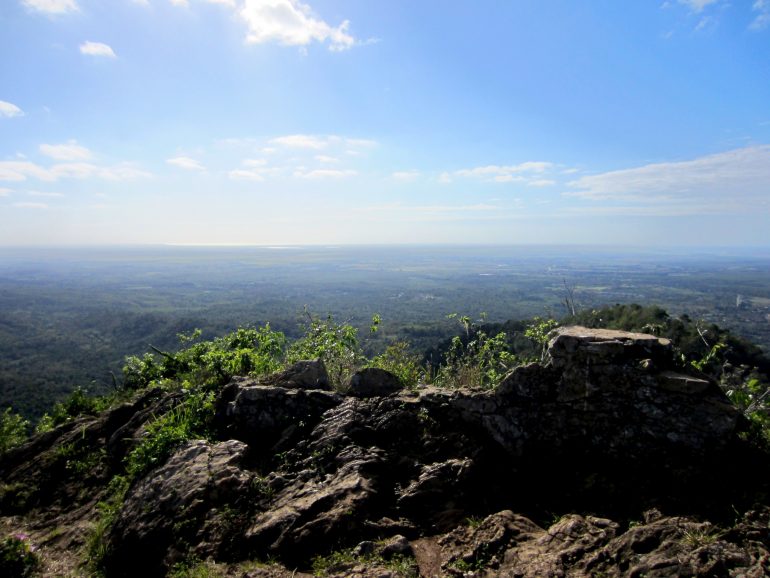
I cross the park once again, this time by muscular strength. From the start, it seems to go uphill constantly. It was a good idea to give my bike a name. That way I always have someone to tell my woes to. Pedro is a good listener and often when I am close to completely giving up I hear him say: ‘¡Sí se puede!’ (Yes, you can!)
My legs hurt and my nipples are still sore from yesterday. My neck ist stiff, I sweat like a pig. I have trouble controlling my body.
First, I pass a small village with colorful houses, people smiling in the morning sun and loud vehicles which are all older than the revolution. I am fascinated that even out here there are American classic cars and monstruous Russian trucks galore. Then I take a turn which is recommended in my book, but actually not marked on any Cuban map. A cyclone has destroyed large parts of the road, signs at the intersection warn against deep holes in the tarmac. I feel advenuresomeness crawling up my spine.
As soon as I have turned it gets quiet, very quiet. For kilometers I see neither people nor animals and slowly make my way across the hills. There is a silence around me which is almost spooky. Then I pass a vaquero, a cowboy with two horses who is greeting me as if in slow motion. After that, there is more nothingness, apparently they have a lot of it around here. Above me, big black vultures are circling. I am hoping that they’re not there because they can smell my exhaustion. Several times, I see woodpeckers in the trees and long roads of leaf-cutting ants which carry big green chunks into the jungle. The downhill after an hour of hardship makes up for the effort, but right after the valley the road rises again. I have long ago given up being to proud to push Pedro along the steep passages.
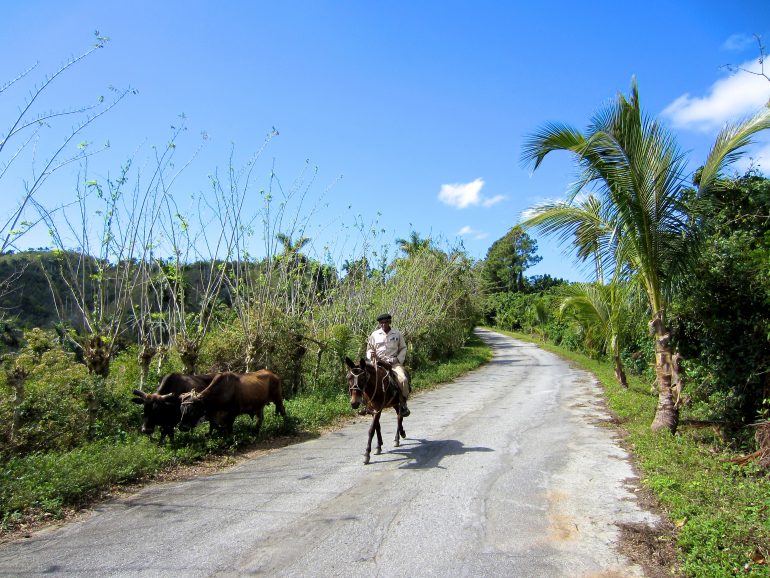
I am starting to feel hungry, but, like in so many places on the island, there is no food to be bought here. So it’s back to steep roads on which you have to face your inner self. I babble and babble as if I were in some kind of trance. I don’t even know anymore if I am talking to Pedro or just to noone at all. Sometimes I pass very simple huts out if which people are waving.
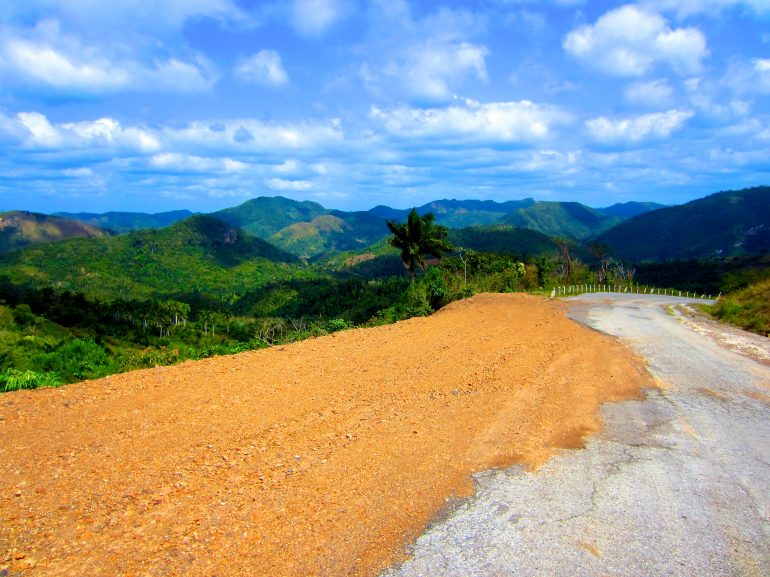
Up and down, without an end. My legs hurt, I am soaked with sweat. I have at least gulped down 4 liters already and I haven’t even had to pee yet. It must be around 35 degrees. Today I am wearing shoes due to the bad roads, and I can already feel signs of blisters. But my hunger is much worse than anything now, I really need new energy. And eventhough I sometimes pass small villages, I can’t find anything to eat. This is a situation I haven’t encountered in any other country.
I start cursing the authors of the book who have recommended this route. But I mainly do that because these two are beyond 60 and apparently have no problem coping with the roads here, while I am almost at the end of my power resources. Reluctantly, I decide for a shortcut on the highway, as I am afraid to collapse otherwise. I roll out of the mountains in the direction of the plain and have to fight many hills in head wind. It smells of burnt sugar cane fields.
When I finally reach the highway ramp, I manage to find a tiny snack bar. First I order two yellow milk breadrolls with butter, then another one with guava jam. Together with these I have two homemade lemonades. It is the best food I have had in months and I feel a strong sensation of euphoria. At this point I do not know that I will catch a painful stomach parasite at one of these places.
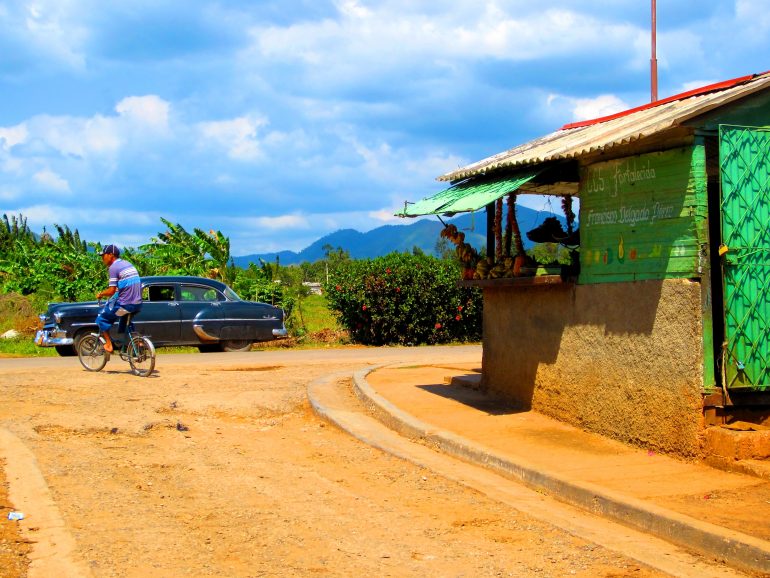
On the highway I can barely believe my luck. All of a sudden, I have tailwind and the clouds have gone, too! So I discard my secret plan of hitching a ride. Instead, I get rid of my shoes and open my shirt in order to use it as a sail. Then I ride free-hand with a ridiculous speed for the next kilometers. There are poeple waiting to get picked up in the shade underneath the bridges. They look at me amazed and amused when I pass them fast as lightning. I am travelling so quick that I end up missing my exit which means I have to backtrack for quite a bit on country roads. Now I can’t even be mad at the head wind anymore. I have long ago apologized for the insults of the last days.
After more kilometers with hills and head wind I stop and have a beer at a little shop. After such hard work everything tastes fantastic. Now in a good mood, I also get a freshly squeezed sugar cane juice at a wooden shack and watch the village life for a bit. Hitchhikers are waiting patiently at the side of the intersection, farmers are coming from their fields and now getting hammered on cheap rum, young folks are looking neat as a pin instead of poverty and country life. A drunk guy dances absent-mindedly in the middle of the intersection. The people seem to be ashamed that I as a tourist get to see stuff like that.
Now it’s not far anymore. I am almost as tired as yesterday and also quite sunburnt when I finally ride into San Diego de los Baños. I pamper myself and get a hotel room, in this village this is not much more expensive than a casa. The view from my room is overlooking the pool and the well-equipped bar.
After a quick shower I walk into the tiny village for sunset. People have already told me that the mineral baths are currently closed, but I wanna see them at least from the outside. While I am petting a filthy dog, Pilu approaches me. The nice middle-aged man offers to get me into the mineral baths, even though they have been half destroyed by the cyclone. He says that paralyzed people have gone in there and come out all healthy. I should not let that chance slip, he thinks. Even the fact that I carry neither a towel nor swimming trunks does not count for him. After all, there is noone else in there anyway, he says. And so I find myself completely alone and butt naked in a decaying hall of communist grandeur and start enjoying the warm water reeking of sulfur in one of the slimy pools. A fascinating and at the same time spooky moment!
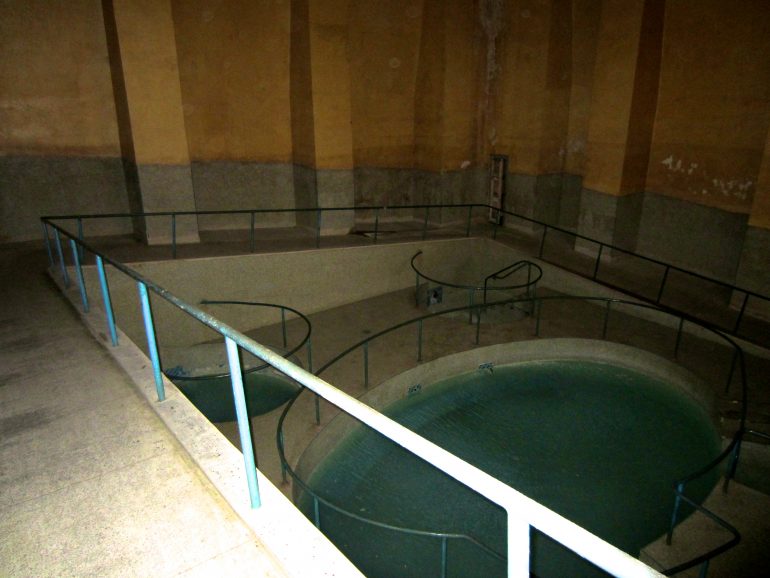
Back outside, I let Pilu, who works as a teacher in the local school and as a professor in the university of Pinar del Rio, guide me to Don Pedro who apparently rolls the best cigars in this part of the country. Pedro is an old, very happy man who smells like fruits, smoke and rum and I watch him fabricate two fresh cigars for us. I do have a slight feeling that the package of cigars he offers me while we smoke is a little too expensive, but these two deserve their profit. Outside again I chat a bit more with Pilu about the life situation here in Cuba. He can barely survive on the 25 dollars he makes a month. Nobody around here can afford purified water. Like many others, he sees the chances for change rather pessimistically. Like so often in Cuba, our conversation ends in a sad perplexity.
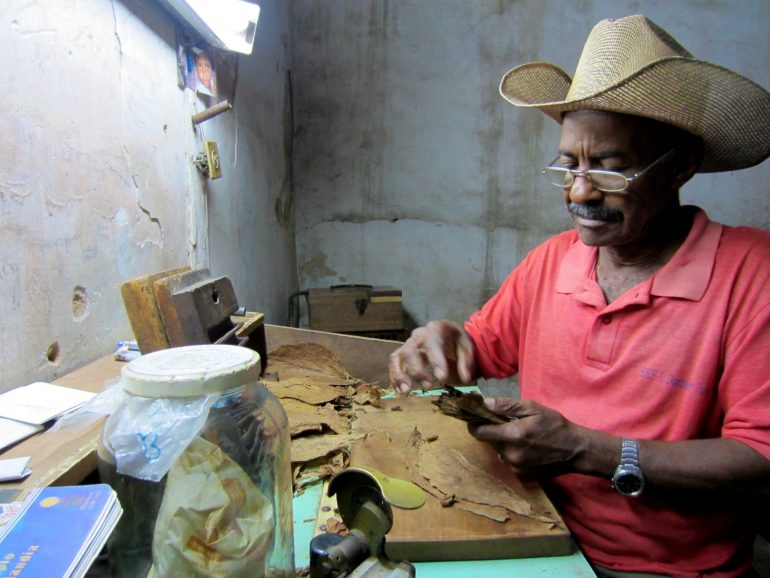
A little later I have a very tasty dinner at the hotel. As a tourist you are being fed the best stuff while the locals often have to stand in line for 2 hours to get a simple loaf of bread. Apart from me, there are two big groups with older people on an organized trip. After dinner there is a band playing for them and I use my book as an excuse not to join the polonaise. After the concert – like almost everyone in this country these guys are exceptionally good musicians – I treat the whole band to a glass of rum at a dollar each. It’s not much for me, but they surely appreciate it. We talk and joke for a bit, then I go to bed tired and happy.
Cycling Cuba – Day 3
Today I want to reach my final destination Viñales and I start early again. I have breakfast together with the annoying group from last night. Some of the people are honestly complaining about a certain type of tea not on offer.
I could take the direct way, but it seems rather boring. Instead, I cross an old bridge and ride along country roads and pass so-called velas, triangular huts where the tobacco is being dried. It soon starts to go uphill again and soon I am all alone once more.
After a few hours I reach the cave where ‘El Che’ had his command center when, during the missile crisis, it looked like the world was going down. I arrive when a group is just leaving, so I get to have the pretty place all to myself. A river is winding through the cave. Even though it is quite brown, there is a very pleasant scent in the air.
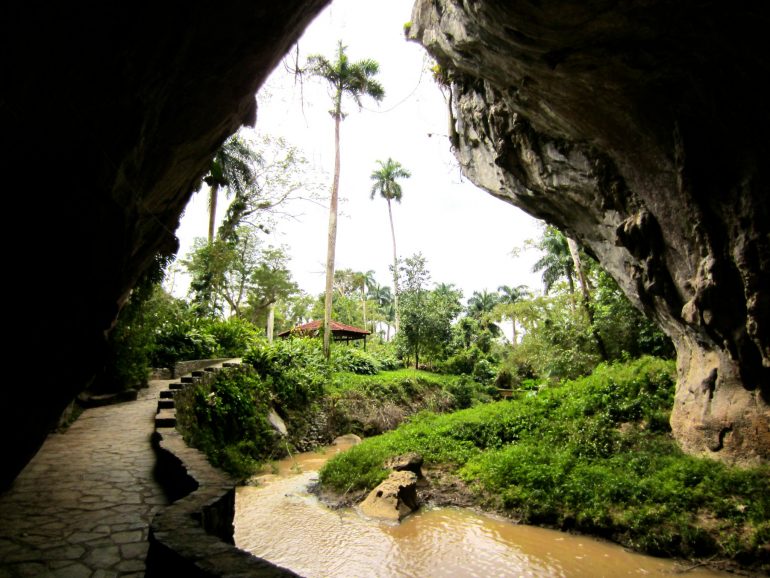
My body longs for sugar again, so I have a coke. With what seems all the time in the world, I watch aome workers renovating the bungalows next to the cave. Again, there is this end-of-the-world feeling.
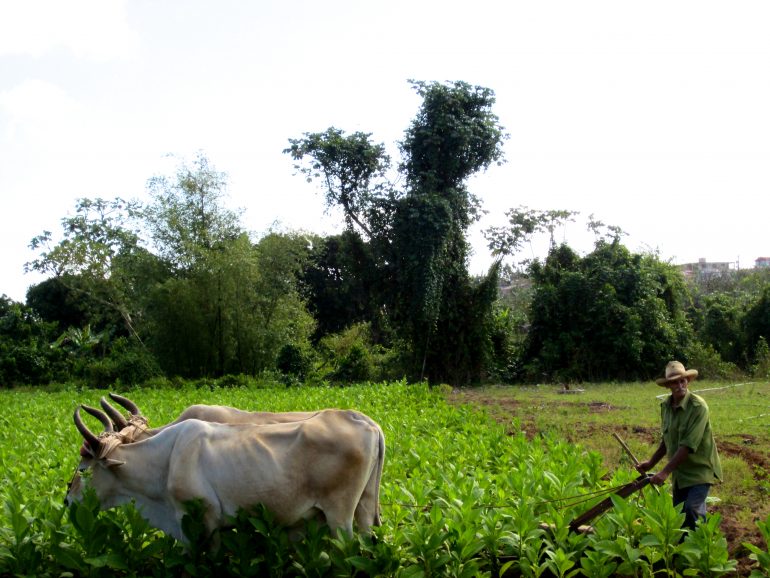
From now on, everything smells intensely, sometimes from blossoms at the side of the road, sometimes from a field a farmer is just burning down. On both sides of the road, there are now massive karst cones and I cycle in awe-stricken silence. I pass banana plantations as well as tobacco and sugar cane fields. The farmers here are wearing rubber boots and till their fields with the simplest tools and the help of their oxen. Pigs, goats and cows are grazing peacefully at the side of the road. The cows always have at least one white bird as company. The tiny villages consist of simple huts, there is music coming from some of them.
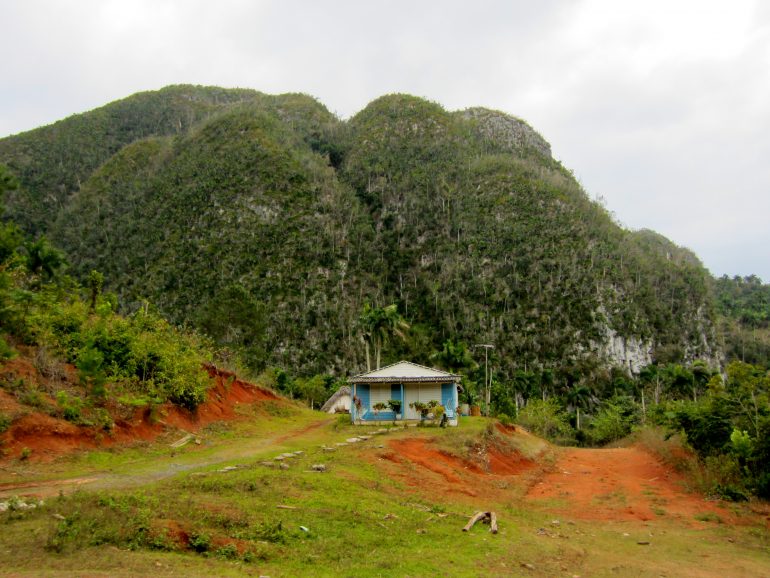
When I meet people here in these remote regions, they greet with an economic sparingness. Some produce short hissing sounds, others only vaguely raise their index finger.
I am getting into some kind of trance. Today I hardly feel any pain and I am riding barefoot again. Cycling has almost become a part of myself. The road never seems to end and somehow I’m OK with that. Luckily, the sun has hidden behind some clouds. I don’t even think about it anymore.
When I reach the first snack bar after hours, I notice that I cannot be too far from my goal. Because now, I suddenly see cars and people and even a bunch of tourist busses. I drink a coffee at 4 cents and eat another jam breadroll, then I go for the final spurt. It’s another uphill, slightly, but going on for several kilometers. Again, I have a feeling that I am working on the emergency reserve of my power. But the views make up for everything. Tobacco fields, old fincas, impressive rocks with caves. And everything shines in such a bright green that it almost hurts the eye.
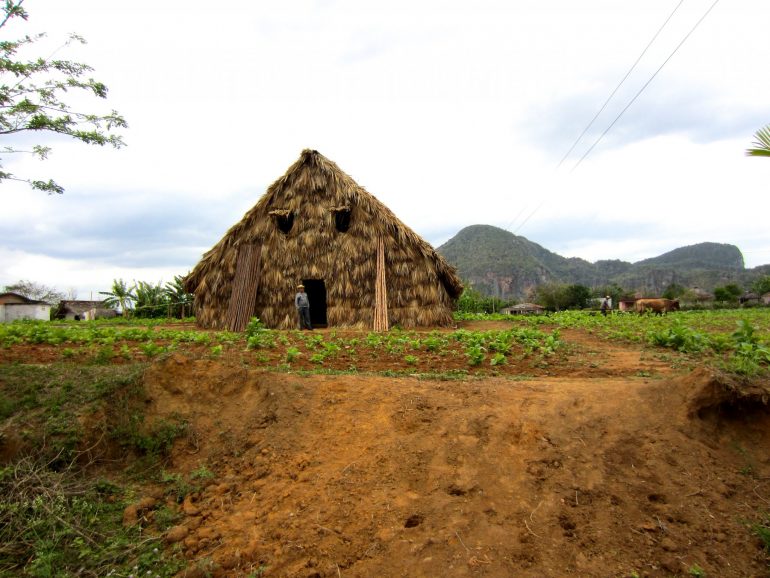
I have barely entered Viñales when I already know that I like it a lot. There are one-storey buildings in many colors which always come with a porch on which the people sit in rocking chairs. That is also the case in the casa which has a place for me to stay. The owner Lydia is a very nice lady and by now my Spanish is good enough to understand almost everything she says. I take a brief shower and then make a little tour through the charming village. There are tourists all over the place, but that’s no wonder. Almost every corner is worth a photo. I have a quick beer at the market place and now feel proud that I have actually made it here on a bike. Should I just cycle the whole way back, too? At the moment I’d be in the mood for that.
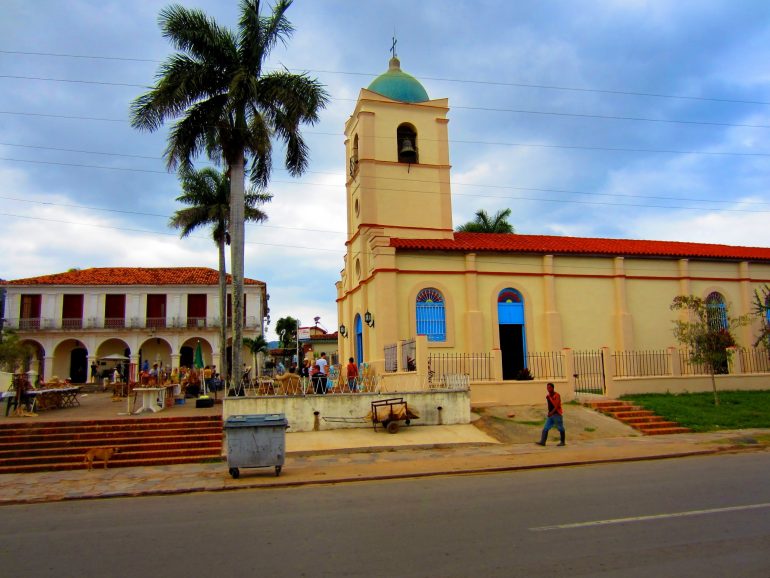
Back at my house, Lydia and her husband mix a fruity Mojito for me and I soon find myself in the rocking chair, drink in one hand, cigar in the other. On my lap there is Lima, the friendly dog, and I feel completely happy. Then Lydia serves a beautiful dinner and we chat for a while. With older people here, I also have a feeling that many of them are not so happy with their situation. But you can tell that they still remember the conditions before the revolution and these were even worse. That makes their judgement milder than that of younger people.
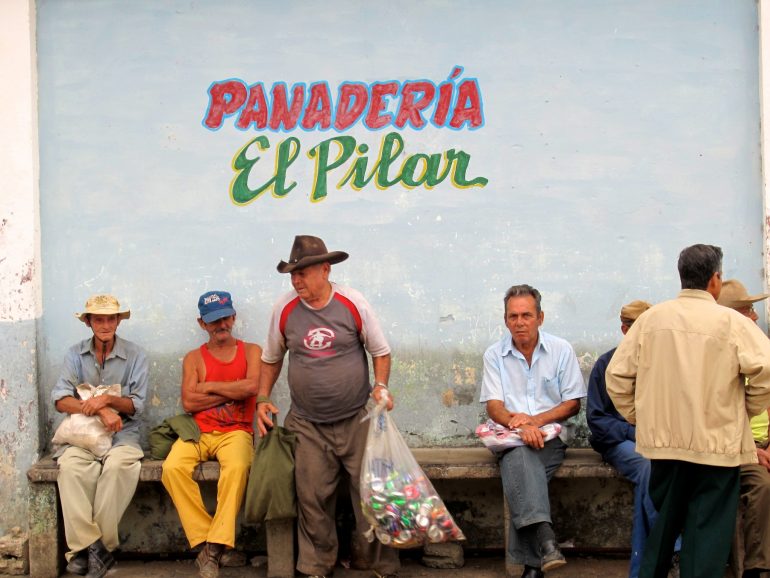
Later, I go out again. While I sit in a bar, drinking rum and smoking, a rather spent woman starts talking to me. Her name is Mercedes and it is quite obvious what she is aiming at. How do I get out of this situation now? I decide for the direct way and tell her that I am not going to sleep with her, but am nevertheless willing to pay for a bunch of drinks. After a few seconds of reflection, the situation changes suddenly and Mercedes starts smiling. She asks a few friends to join us and we talk and drink together. I invite the whole group into the ‘salon de baile’, the local dance club and treat them to a bottle of rum. We spend a great night together. The girls try to teach me salsa in vain while Gregorio, some remote relative of Mercedes, gives me advise on drinking and other important things on the island. For example, you always pour the first sip of a bottle of booze on the ground to appease the ‘orishas’, the spirits. I also learn that ‘agua’ is currently the hippest word to describe anything good. That explains why you hear it in every second regueton song.
For the first time ever, I also get to see sex tourism with swapped roles in this strange club. Dolled up, sunburnt blondes let the first latino guy take them away who approaches them with a shake of his hips. Also that way round, sex for sale is not a pleasant thing to look at.
Slightly derailed I stumble home long after midnight. I have an invitation to my new friends to Pinar del Rio in my pocket.
Day 4
I start the day with a short ride to a viewpoint which gives me the best view of probably the nicest panorama in all of Cuba. The Viñales valley shines in a magic green and the rocks and tobacco huts seem like painted. Then I roll back home to Doña Lydia and pick up my things. Now I want to go to the ocean.
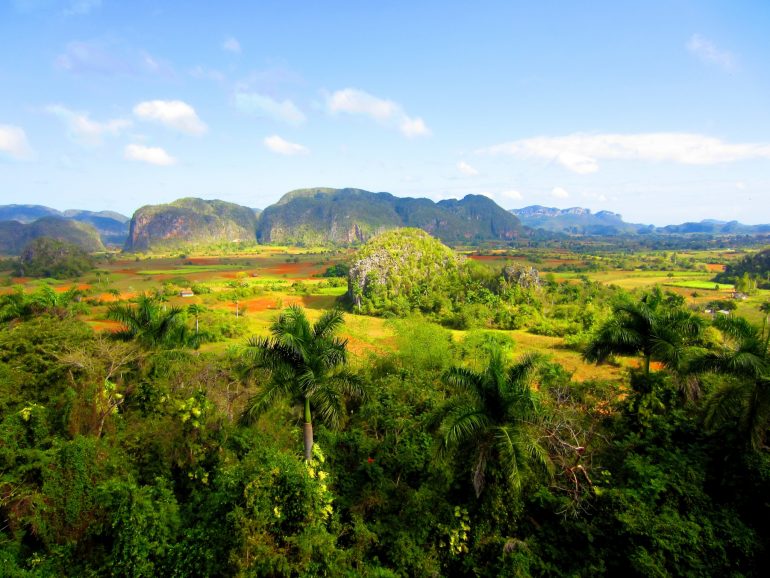
I need about three hours for the 25 kilometers. The roads are hilly, it is extremely hot and I am slightly hungover. Just outside of Viñales, I see an accident on the road. It does not look like the motorbike driver has survived. My mood gets even worse now. Grumpily I cycle on and try to hide my face from the relentless sun.
At the city limits of Puerto Esperanza there is a dead dog in the middle of the road, spilling his last drops of blood. I get a bad feeling immediately which only grows stronger, the further I enter into the rundown village.
There is no beach like I expected, but only a dirty harbour. Half-collapsed buildings in communist architecture, everything and everyone seem paralyzed. But then I remember people have told me that you can eat the best crawfish in the world here. After a short search I find the old lady whose culinary art is being praised by many notes on the wall by people from all over the world. But unfortunately, there is no crawfish today due to the strong wind. Instead, she prepares a very tasty fish for me and tells me stories of when she met Che Guevara many years ago when the American battleships were sitting just off the coast. He was a serious man, but very nice, she says.
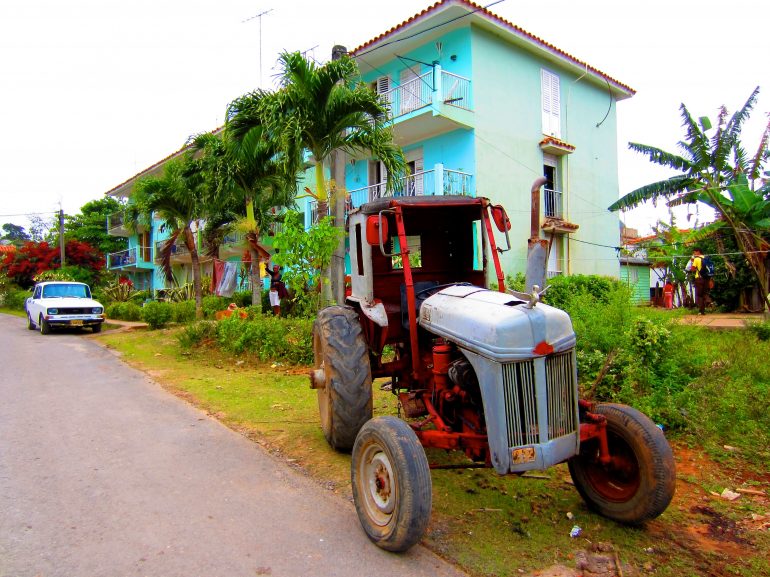
I ask her what life is like in Puerto Esperanza and she says: ‘Very hard.’ There is not enough of anything and she can only afford a lot of things because she has friends abroad who support her financially. She seems to have come to terms with things not changing anytime soon. Resignation is a reoccuring feeling that remains after conversations.
I decide to go back to Viñales, even though I am now even more exhausted after the food. On my way, I am not even sure anymore if I am really going to make it. Soon, I cannot think anymore and have the feeling that I will soon pass out. The sun, the mugginess, the big, buttery fish in my stomach… First, I stop at a deserted gas station and drink a coke and a whole bottle of water. Then I sit beside Pedro for close to an hour, trying to get my blood circulation back to normal and my brain to work properly. Luckily, clouds appear and there are also a few drops coming down.
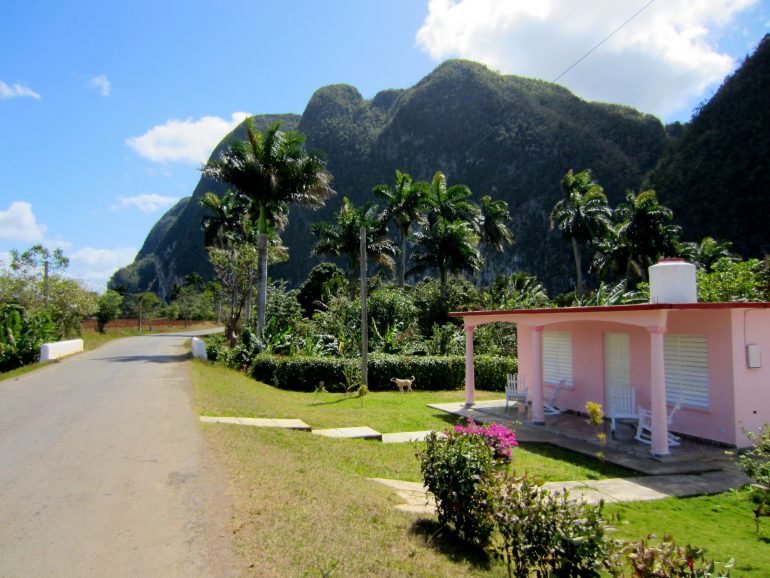
Back in Viñales I take a stroll through the pretty village once again and take pictures of cars, old people and kids playing socker. Then I go to bed very early. Before that, I decide that I have had enough now. I book a ticket for a bus for the next day, Pedro will ride in the trunk.
I fall asleep with a feeling that it is hard to actually get much closer to the locals than I have gotten on this bike trip. But this is good and bad at the same time. Because if you start talking to people more deeply, it is hard to ignore the desperation and the sadness. There is one sentence I have heard several times and cannot forget: ‘The dream of one man (Castro) has become the nightmare of 11 million people.’
This post is also available in: German


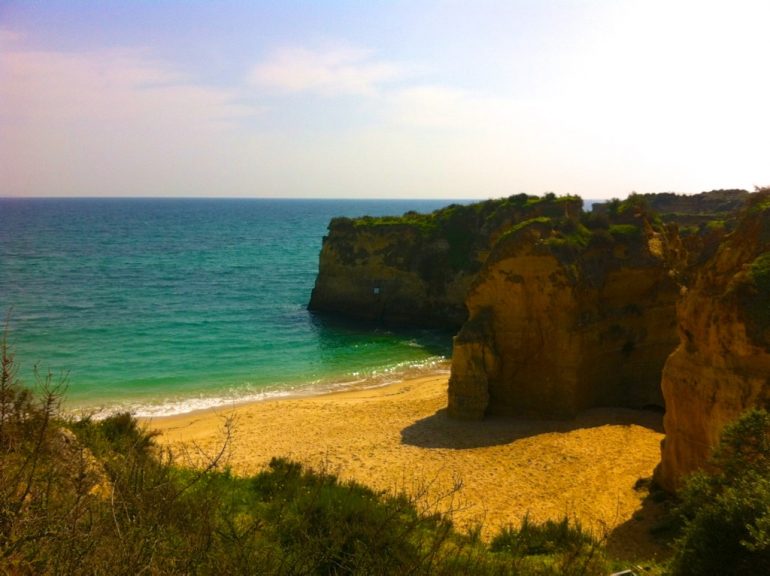
I’ve just found your blog, and am enjoying what I’ve read so far. Blogging has taught me all kinds of things, and it’s quite addictive. It’s also helped to increase my online presence far more than my static websites could do specifically with regard to sports physiotherapy . When customers and clients find me, they feel like they already know me because they’ve been reading my posts for awhile. That’s a great feeling when they do reach out and contact me.